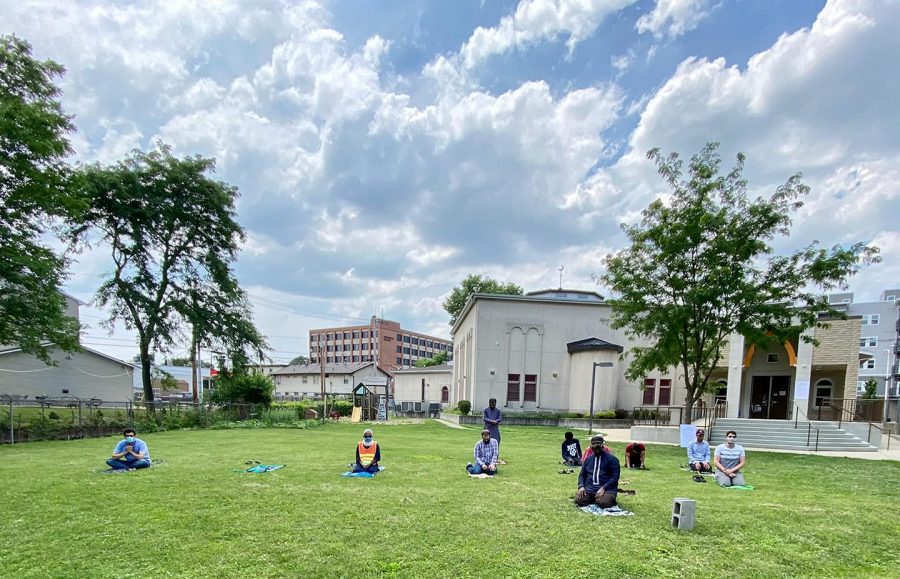Students push for accommodations during Ramadan
Photo Courtesy of CIMIC-Central Illinois Mosque And Islamic Center’s Facebook
On July 4, people came together to pray outside during the pandemic following all guidelines and safety rules. Students at Illinois are working to get accommodations during Ramadan because of the holiday’s celebrations festivities.
May 9, 2021
From April 12 to Wednesday, May 12, Muslim students across the University celebrate the Islamic holiday Ramadan. Throughout the month, Muslim students celebrate this holy time with fasting, prayer and reflection with other members of their community.
As celebrations continue through the month, one of the primary practices that Muslims take part in is daily fasting or taqwa. In order to achieve taqwa, Muslims must abstain from eating or drinking any water from sunrise to sunset.
However, before keeping a fast in Ramadan, Muslims begin with a meal called suhoor or sehri where you eat before sunrise. During the day, Muslims fast, keep up with the five daily prayers and read the Holy Quran. Once the sun sets, Muslims break their fast with family and friends and attend Taraweeh, their nightly prayer.
While Ramadan is a time filled with reflection and community, many say it can be somewhat challenging given the heavy schedules college students have. Many Muslim student’s schedules have needed adjustments in order to complete schoolwork and take part in Ramadan celebrations.
“A typical day during Ramadan includes staying up until sunrise and eating Suhoor,” said Hidayah Afzal, freshman in AHS. “I then wake up for my classes and complete my five daily prayers and proceed to break my fast at sunset. Followed by this, I go to the mosque and pray a nightly prayer with my friends.”
Get The Daily Illini in your inbox!
Fasting is one of the most important aspects to Ramadan, but Sophia Jandry, freshman in LAS, said it can also be challenging to students given the meal schedule and proximity to finals.
“If I’m being honest, fasting has impacted my schoolwork in some ways,” Jandry said. “I am trying my best, and I know myself and my routine very well, so I definitely make it work just as other Muslims on campus are.”
According to Afzal, despite the challenges of fasting to Muslim students, there is still a positive feeling associated with this holy month.
“To me, Ramadan not only includes abstaining from food and water but also connecting with oneself spiritually and becoming a better person,” Afzal said.
During Ramadan, the University has provided accommodations for Muslims, said Allison Kushner, director of the ADA Division of the Office for Access & Equity.
“Providing accommodations is what we do in the Office for Access & Equity everyday,” Kushner said. “The ADA Division is always here to help the University community.”
This year has been unique, compared to years prior due COVID-19’s impact on Ramadan. The University’s saliva testing option has proven to be a challenge for Muslim students who are fasting, and cannot provide enough saliva for a sample.
One of the ways the University is accommodating Muslim students impacted by this is by providing a nasal swab option.
“Committed to equity and inclusion for members of all religious communities, the University wanted to ensure that those fasting could do the nasal swab as an alternative option,” Kushner said. “It is important that all students have access to the University’s programs and services. By providing this alternative accommodation, we can ensure that students have the ability to access and take part in campus activities while observing Ramadan.”
Additionally, the University has given Muslim students the option of trading in meal swipes at the dining hall for refunds. However, Jandry said this policy doesn’t take into consideration that students still must eat before and after fast.
“It upsets me that the University is not at all as accommodating to Muslim students and their religious practices as they are to Christian and Jewish holidays,” Jandry said. “I wish that the University was more lenient and gave more understanding towards the Muslim community during this time in understanding. Although we are college students, we are Muslim Americans first.”
Throughout the month, the Muslim Student Association has offered different events and activities for students to participate in.
“There is a strong sense of unity and community within MSA that has made celebrating Ramadan special this year,” Jandry said.
“We have done different sports events and discussions where we get to hang out with our friends and get to know upperclassmen,” Jandry said. “I am so thankful to the MSA for these events and proud.”






